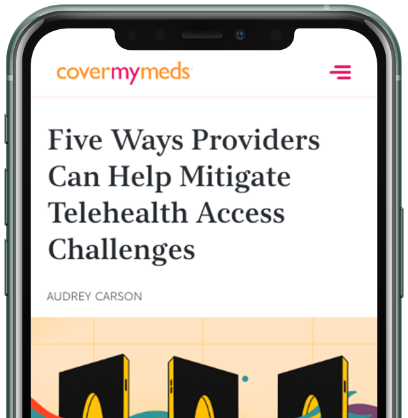A Manufacturer Cash-Price Program May Be a Better Option for Patients
Americans paid cash for an estimated 194-million prescriptions in 2018.Number of Retail Prescription Drugs Filled at Pharmacies by Payer, Kaiser Family Foundation, 2018

They are increasingly paying for their health care out of their own pockets, whether due to a lack of health insurance or a health insurance plan with a high deductible they’re unlikely to meet.
In 2017 and 2018, the average patient’s out-of-pocket costs rose 11 and 12 percent respectively, according to TransUnion Healthcare.Out-of-Pocket Costs Rising Even as Patients Transition to Lower Cost Settings of Care, TransUnion, 2019
Unfortunately, many who are faced with the imperfect choice of paying for a prescription with cash or simply leaving the pharmacy without it opt for the latter.
In fact, half of all patients have chosen not to fill a prescription because it cost too much when they arrived at the pharmacy.CoverMyMeds Patient Survey, 2018 Additionally, of those who filled the prescription at least once, more than a third failed to refill the medication due to the cost.CoverMyMeds Patient Survey, 2018
Prescription abandonment has an enormous impact on health care spending — resulting in billions of dollars in avoidable costs each year.Interventions to Improve Adherence to Self-administered Medications for Chronic Diseases in the United States: A Systematic Review Further, when patients don’t adhere to their prescribed therapies, they risk disease relapses and complications, sometimes even leading to hospitalizations.
Medication non-adherence, which encompasses prescription abandonment, accounts for 10 percent of all hospital admissions and results in 125,000 deaths annually.The Cost of Not Taking Your Medicine
How a Manufacturer Cash-Price Program Offers a Better Way
Patients, more than ever, are consumers when it comes to their health care, and why not?
In today’s world, with a marketplace at their fingertips, consumers comparison shop for everything from flowers to furniture — with a delivery option straight to their door.
The same is becoming true for medications.
Patients will shop around and compare prices, always looking to rein in out-of-control out-of-pocket costs with their medications. And with high-deductible plans growing more common every year, this trend will likely continue as patients fail to meet their deductibles for themselves or their family.
In fact, according to the Centers for Disease Control and Prevention (CDC), more than 40 percent of Americans were on high-deductible plans in 2017 — a sharp increase from the 25 percent that had one in 2011.
These high-deductible plans mean the average annual premium contributions for family coverage have increased 78 percent from 2006 to 2016.“Employer Health Benefits Survey,” Kaiser Family Foundation, 2016 In 2017, that meant patients spent $57.8 billion in out-of-pocket costs for medication.Medicine Use and Spending in the U.S.: A Review of 2017 and Outlook of 2022 Iqvia Institute for Human Data Science
Due to these statistics, nearly half of patients surveyed on high-deductible plans stated that the cost of medication is a burden.CoverMyMeds Patient Survey, 2018 That same percentage also say they price-shop at multiple pharmacies, potentially delaying therapy.
Aside from navigating high out-of-pocket costs, shopping for medications can also be confusing. After all, prices can change daily, and from pharmacy to pharmacy.
That is where a manufacturer cash-price program comes in.
Complementing efficiency and price-transparency solutions like electronic prior authorization and real-time benefit check, both used by health care providers and pharmacies themselves, a manufacturer cash-price program empowers patients — particularly those seeking cash options to take control of their own medication management.
The manufacturer cash-price program works by streamlining the prescription-adjudication process and connecting patients to the brand-name medication manufacturer.
For the patient, that means a set-price for their brand-name medication that may also be lower than what they were previously paying. And with consistent cost savings, barriers to the patient and provider’s preferred therapy could be further dissolved.
For example, say the doctor’s preferred therapy is a brand-name medication approaching loss of exclusivity. The out-of-pocket cost for the patient is around $300, making it likely they’re going to abandon the therapy. But with a set price of $55 — every time — that patient is more likely to fill their prescription and stay on their therapy plan, even past patent expiration.
Furthermore, this approach can work two ways, depending on needs and preferences. By eliminating the need for rebates or copay cards, the prescription-adjudication process can not only become more affordable for the patient through streamlined access to the medication, but can also be simpler and easier to follow. Or, if the patient prefers using existing rebate and copay solutions, this program can also work alongside those as well, giving the patient even more options when managing their prescriptions.
In short, the manufacturer cash-price program is simple and convenient and offers significant savings for the patient. Providers can rest, too, knowing their patients are more likely to stay on the preferred therapy plan due to predictable and more affordable cash prices. At the same time, the brand-name drug manufacturer knows the patient-brand relationship is further cemented, while their market leadership is also extended beyond loss of exclusivity.
Learn more about the ScriptHero Platform, our newest solution aimed at improving medication access for patients by emailing mailto:hello@scripthero.com
The latest healthcare insights, floated right to your inbox.



